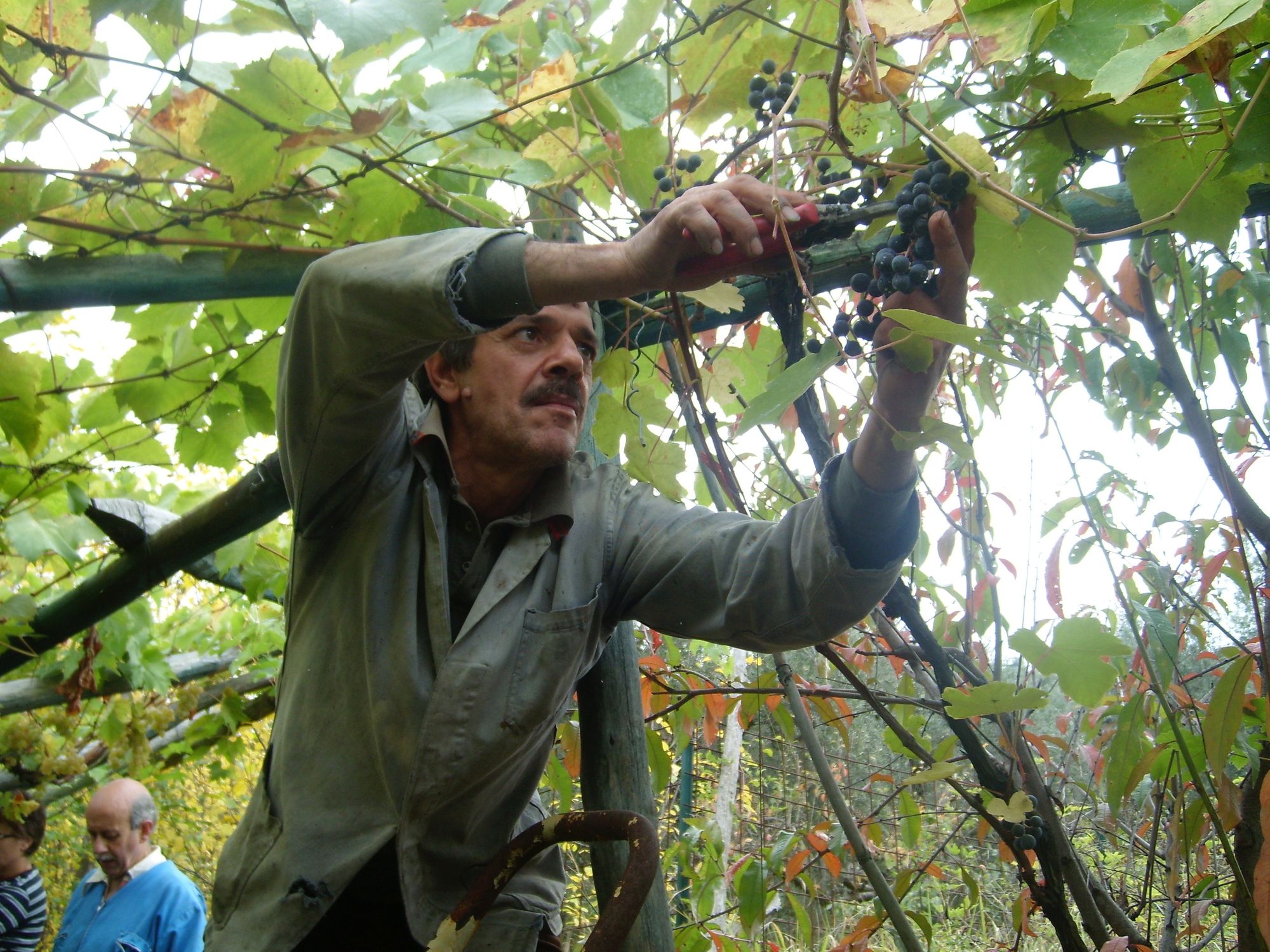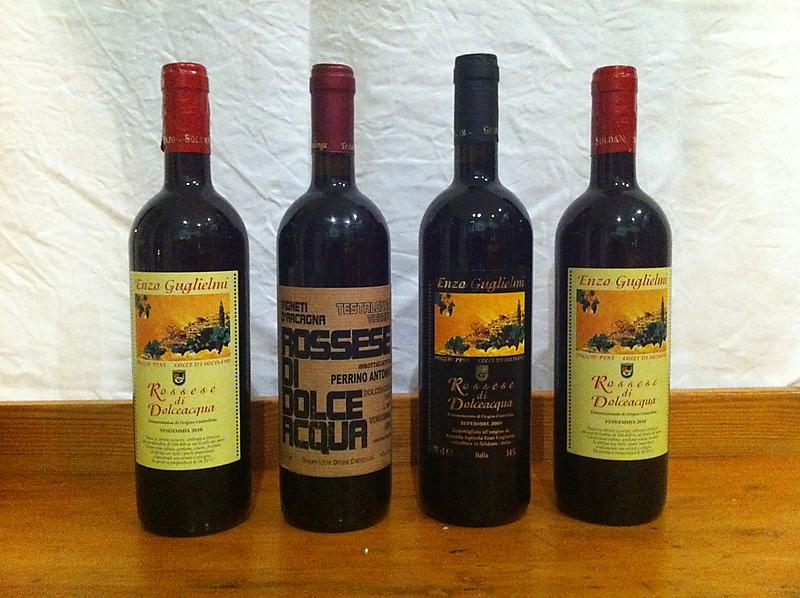Dolceacqua wines
The small purple Rossese grape is little known outside the Nervia valley and grown nowhere else in the world. Napoleon was reputed to drink Rossese wine and its reputation is steadily being revived by visitor interest and the efforts of local entrepreneurs. It is grown almost exclusively in Liguria, apart from a few vineyards in the Roya valley over the border in France, where the vines are known as Tiouren. Vineyards are usually high up on the hillsides, where they benefit from cold nights which give a little acidity to the fruits but south facing to gain maximum sunshine.
More and more family vineyards are selling their produce commercially as single estate bottles. The most skilled make lovely wine and some distil good grappa too.
Gordon Home, an English traveller writing in 1908, commented on the ‘baskets full of luscious purple grapes’ carried into the village of Apricale for pressing. Steep local hillsides continue to defy mechanisation and ‘la vendemmia’ is still a time for family and friends to pick and press grapes by hand, as well as eat lunch in the open air together. Gordon Home recommended tasting as the only way to distinguish poor quality from ‘truly wonderful’.
The best local wines are ruby bright in colour, light and refreshing to drink, with deeper hints of fruit. Tasting is still the only way identify the best. Locally organised wine tasting is available in Dolceacqua in the summer months – ask at the tourist office - but you can quite easily devise your own local tour. Most restaurants have selection.
On both hillsides above Dolce Aqua and over the hill towards Soldano you can spot the neat rows of vines. The vineyards are small, the terraces steep and the vines are not high yielding. All the cultivation must therefore be done by hand, more a labour of love or a family tradition, than a money making venture. With a few notable exceptions, family vineyards are falling into disuse. The younger generation are moving away, or commuting to work. The rhythm of their lives doesn’t allow time for watering vines, stripping leaves, picking and processing. Producing Rossesse wine was becoming a dying art.
But a few individuals are preserving and rebuilding. When you spend time in Nervia Valley you can help to preserve the landscape, the art of wine making and the grape, while enjoying all the flavours of the valley in a glass. The mixture of clay and limestone soil, the bright coastal sunshine, the sea air and the temperature variation caused by winds from the mountains all leave their mark on these lovely wines.
Check into one of the the wine tasting evenings available in Dolce Aqua (see their website or calendar of summer events) to learn more or visit the producers, taste and buy. Rossesse varies from light and fresh which some claim, can be drunk chilled, to fruity fuller flavours more suitable for drinking at room temperature (18c). A good partner to some of the robust dishes of the area, goat and beans, rabbit with herbs and funghi. The wine takes 6 to 8 months to mature, is at it’s best 1 to 3 years later and should be drunk within 5 years.

Here are some of our favourites to get you started.
Testalonga, Antonio Perrin has a tiny cellar in side street in Dolce Aqua. His total production is 7 barrels total. He has been making wine for over 50 years. His family vineyard is about 100 years old, most of his vines are around 30 or 40 years old.
The Giuliani family began their viniculture on the hills Soldano in 1839. The current proprietor learned his art from his grandparents and began his first production in 1965. His vineyard is beside Terra Bianci above Dolceacqua, a small one man and his mother operation. This wine is fermented in wooden barrels without yeast or additives in the cantina from which the wine is sold in Dolceacqua. To taste and buy mention ‘Testalonga’ in Marta’s bar (Bar in Piazza) in the square or to anyone sitting in the sun near the tourist office and get cantina directions. This traditional organic Rossese with distinctive brown paper label has a delicious deceptively light but earthy quality and DOC registration. Mother and son also produce a coloured Vermentino typical of the Nervia area, which takes around 4 years to mature. Very good, but with no DOC registration because of the off white colour produced by fermenting over the grape skins. Price around 10 euros from the cantina, more if you buy in local shops and restaurants.
Danila Pisano
A Ciassa and Apricus in Apricale both include Danila on their list as do a number of other establishments. Danila took over her family vineyards in 1990 determined to re-establish them without the use of harsh chemicals in the vine cultivation or wine making. By 1996 she had received an organic certification. Her plots are high up, facing south west on several hills between Apricale and the sea. Like most of the land owned by Apricalese, her terraces are steep and narrow, making mechanisation difficult, if not impossible. Her vineyards are worked by hand. Her wine has been described as having a fresh, light, crushed plum quality, with rustic and savoury notes.
These wines are not for keeping so drink them while you are here !
Guiliami Enzo
Our current best buy. Located in Soldano, the village is not in the valley Nervia but his vines are to be found on the eastern slopes above Dolceaqua. The wine is sold from a cantina below Enzo’s home in this village just above Vallecrosia, on the road to Perinaldo. Enzo produces two qualities of slightly black current flavoured yet refreshing, Rossese, a bargain at 6 and 7.50 euros. Soldano producers such as Guiliami are reputed to have rescued the Rossese grape from the European wine lake years and begun the process of re-establishing it’s reputation. Guiliami’s wine is also available in good restaurants such as Delio in Apricale. ‘Poggi Dell Elmo’ has cultivated vineyards close by since 1972 and also sells from his Cantina in Soldano. This wine is similarly stocked by the best local restaurants.
Terre Bianche
This beautiful vineyard commands fabulous views over the valley (to find it take the left turn from the Rocchetta road towards La Colla). Two generations have produced wine commercially in this lovely spot using traditional methods. Only copper sulphate, the distinctive blue Bordeaux Mix is used in cultivation. This family now grow a range of grapes and are making several good DOC status wines which you can taste if you visit: a smooth and rich Rossese, a rich deep wine which is Rossese mixed with Cabernet Sauvignon grapes and a range of whites. In all sixty thousand litres per year are produced. Vineyard prices start from 11 euros (top of the local price range but worth it).
Agricola Caldi Dolceaqua
We don’t know much about the producers of this wine, we presume a local cooperative, but we can certainly recommend this one. The address to buy from the producer is vicolo tibaudo in Dolceaqua. A rich ruby coloured Rossese, capturing the scents of local hillsides in its warm and earthy aroma, sip and taste the scents of rosemary, plums and chestnut blossom. The bottle like its content is distinctive, a black label with a nice outline sketch of Dolceaqua. We drank this wine in Bruno’s recently and our Dolceaqua based plumber brought a dozen good bottles to a party some years ago. Coming from the heart of the village he should know his Rossese!
Gajaudo
One of the larger producers, by local standards, using grapes from a variety of local vineyards. You can see the large cantina in the valley on the left hand side of the road up to Pigna. Gajaudo produce good red and white DOC wines from local grapes which are sold from the cantina and in shops and restaurants around the area. Two qualities of fresh, clean, berry flavoured and tawny coloured Rossese wine are available at reasonable prices.
Foresti
This is a smaller commercial producer, again using local grapes from various producers, conveniently located in Camporosso close to the main supermarket ‘Maxi Sconto’. Like Gajaudo, Foresti make a typically light and not quite red wine from locally grown Rossese grapes. Foresti has a clean, astringent quality which blends well with local dishes.
Shops in Apricale and Dolceaqua stock a growing range of local wines. New labels appear each year. Explore and taste for yourselves!

